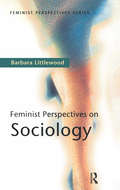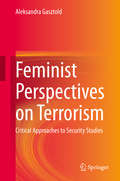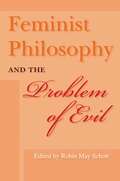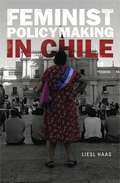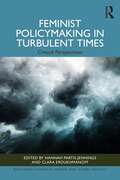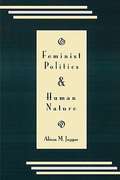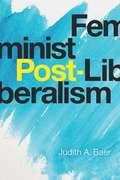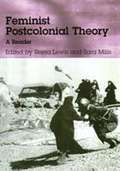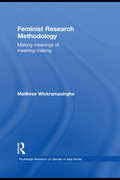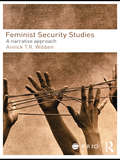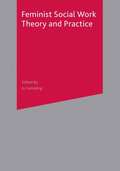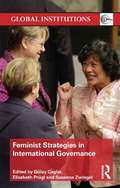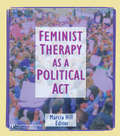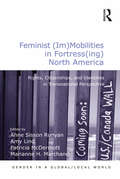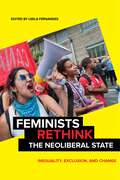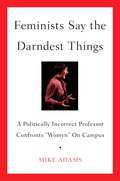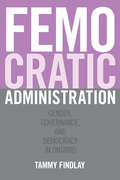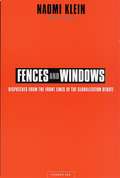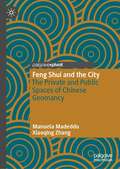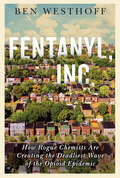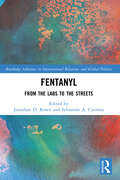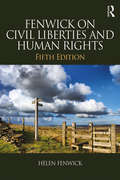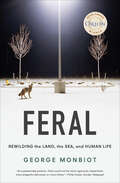- Table View
- List View
Feminist Perspectives on Sociology (Feminist Perspectives)
by Barbara LittlewoodThe Feminist Perspectives Series seeks to provide concise, accessible and engaging introductions to key feminist topics and debates. The texts in the series are designed to be used on a wide range of courses touching feminist issues and are written by experienced teachers who are also well known in their respective fields. Each book in the series includes the most up-to-date statistics, research data, key sources and suggestions for further reading.Feminist Perspectives on Sociology examines how sociology has been transformed under the influence of feminism in recent years. This transformation consists both of a critique of established areas and the opening up of new ones. Areas and issues covered include approaches to knowledge and research, patriarchal relations, work in and outside the home, body politics, sport and fitness, migration, violence, the state, and globalisation. The book also reviews a range of ‘post’ perspectives and arguments including postmodernism, postcolonialism and postfeminism. Feminism is also a transformative social movement. Its political impact, from local to transnational levels, has to be taken into account in assessing developments in sociology, providing it with a connection between research and action.Key featuresProvides a comprehensive and accessible introduction to feminist perspectives in sociology Discusses and assesses sociological and feminist theories in relation to case studies Covers a wide range of current issues that will interest readers from many disciplinary backgrounds Includes end of chapter summaries, suggestions for further reading and a glossary of key termsBarbara Littlewood is Lecturer in Sociology, University of Glasgow.
Feminist Perspectives on Terrorism: Critical Approaches to Security Studies
by Aleksandra GasztoldThis book explores terrorism and security issues from feminist perspectives, putting gender and androcentrism at the heart of its analysis. It argues against traditional research approaches to political violence, and terrorism in particular, that are dominated by the “male-gaze” and individual stereotypes and perspectives, and that feminist approaches offer a fresh perspective on security research. Our current understanding of political violence is primarily based on the experiences of men, and as such, the challenge in terrorism and radicalization research is to demonstrate that women’s studies on security and terrorism satisfy certain universal criteria. The author shows how a post-positivist approach can be useful in gaining insights into terrorism and violent extremism, and how to address these phenomena. The book presents theoretical foundations based on various feminist assumptions, and exposes the essence of feminism, its conceptual grid, gender variabilities and the developments in feminist thinking and theory. Furthermore, it discusses the trends in feminist epistemology, and explains female radicalization to terrorist activity, the specificity of female terrorism, and the roles of women in deradicalization processes, as well as their impact on counterterrorism policy. The book concludes that gender difference as a constitutive variable of social reality is of key importance in studies on terrorism and counterterrorism.
Feminist Philosophy and the Problem of Evil
by Robin May SchottAny glance at the contemporary history of the world shows that the problem of evil is a central concern for people everywhere. In the last few years, terrorist attacks, suicide bombings, and ethnic and religious wars have only emphasized humanity's seemingly insatiable capacity for violence. In Feminist Philosophy and the Problem of Evil, Robin May Schott brings an international group of contemporary feminist philosophers into debates on evil and terrorism. The invaluable essays collected here consider gender-specific evils such as the Salem witch trials, women's suffering during the Holocaust, mass rape in Bosnia, and repression under the Taliban, as well as more generalized acts of violence such as the 9/11 bombings, the Madrid train station bombings, and violence against political prisoners. Readers of this sobering volume will find resources for understanding the vulnerability of human existence and what is at stake in the problem of evil.
Feminist Policymaking in Chile
by Liesl HaasThe election of Michelle Bachelet as president of Chile in 2006 gave new impetus to the struggle in that country for legislation to improve women’s rights and highlighted a process that had already been under way for some time. In Feminist Policymaking in Chile, Liesl Haas investigates the efforts of Chilean feminists to win policy reforms on a broad range of gender equity issues—from labor and marriage laws, to educational opportunities, to health and reproductive rights. Between 1990 and 2008, sixty-three bills were put forward in the Chilean legislature as a result of pressure brought by the feminist movement and its allies. Haas examines all these bills, identifying the conditions under which feminist policymaking was most likely to succeed. In doing so, she develops a predictive theory of policy success that is broadly applicable to other Latin American countries.
Feminist Policymaking in Turbulent Times: Critical Perspectives (Routledge Studies in Gender and Global Politics)
by Clara Eroukhmanoff Hannah Partis-JenningsFeminist Policymaking in Turbulent Times offers a unique and timely reflection of the critical debates around the institutionalisation of feminist and gender-focused ideas and norms into policy.Many states and non-governmental organisations are increasingly invested in ‘feminist policymaking’ at the domestic and international levels. Yet, this liberal (feminist) agenda is also vastly disputed by critical, intersectional, and decolonial voices on the one hand, and by anti-gender movements around the world on the other hand. Indeed, while opposition to ‘gender ideology’ is mounting from reactionary, religious, and secular forces, feminist policymaking is also being challenged in important ways from within. Thus, this book situates feminist policymaking in a challenging and ‘turbulent’ global context. This book explores feminist policymaking in multiple areas of policy, examining various gender-focused programmes that states and international organisations have undertaken in the last decade, offering critical interventions and rethinking the relationship between feminism and policy. This book not only reflects on the advances of feminist policymaking globally but also critically assesses the intersectional challenges embedded within it and lying ahead. It moves the field forward by creating opportunities, based on lived experiences, for re-imagining the transformative potential of the nexus between feminism and policymaking. Interdisciplinary in scope and bringing to the fore the voices of both academics and practitioners, this book is the product of an international collaboration, forging links and dialogue that are increasingly necessary to question some of the exclusionary, militaristic, and hierarchical assumptions of policymaking which is labelled as feminist.Feminist Policymaking in Turbulent Times will be of interest to all scholars, students, and practitioners interested in the role of gender in policymaking and concerned with contestations around gender-focused projects.
Feminist Politics And Human Nature
by Alison M. JaggarWritten about twenty years after the birth of the women's movement in the 1960's, Feminist Politics and Human Nature analyzes that movement's writings and goals as political theory. Alison M. Jaggar attempts to sort the varied and often contradictory statements of the feminist movement into coherent systems of thought. In doing so, she traces the assumptions about human nature that underlay each system and its implied or explicit "solutions" to women's inequality.
Feminist Post-Liberalism
by Judith A. BaerFeminism and liberalism need each other, argues Judith Baer. Her provocative book, Feminist Post-Liberalism, refutes both conservative and radical critiques. To make her case, she rejects classical liberalism in favor of a welfare—and possibly socialist—post-liberalism that will prevent capitalism and a concentration of power that reinforces male supremacy. Together, feminism and liberalism can better elucidate controversies in American politics, law, and society. Baer emphasizes that tolerance and self-examination are virtues, but within both feminist and liberal thought these virtues have been carried to extremes. Feminist theory needs liberalism's respect for reason, while liberal theory needs to incorporate emotion. Liberalism focuses too narrowly on the individual, while feminism needs a dose of individualism. Feminist Post-Liberalism includes anthropological foundations of male dominance to explore topics ranging from crime to cultural appropriation. Baer develops a theory that is true to the principles of both feminist and liberal ideologies.
Feminist Postcolonial Theory: A Reader
by Sara Mills Reina LewisFeminism and postcolonialism are allies, and the impressive selection of writings brought together in this volume demonstrate how fruitful that alliance can be. Reina Lewis and Sara Mills have assembled a brilliant selection of thinkers, organizing them into six categories: "Gendering Colonialism and Postcolonialism/Radicalizing Feminism," "Rethinking Whiteness," "Redefining the 'Third World' Subject," "Sexuality and Sexual Rights," "Harem and the Veil," and "Gender and Post/colonial Relations." A bibliography complements the wide-ranging essays. This is the ideal volume for any reader interested in the development of postcoloniality and feminist thought.
Feminist Research Methodology: Making Meanings of Meaning-Making (Routledge Research on Gender in Asia Series)
by Maithree WickramasingheThis book focuses on feminist research methodology, exploring and analysing its constituting methods, theory, ontology, epistemology, ethics and politics, and research issues relating to women, gender and feminism in Sri Lanka. The book examines ways of meaning-making for the political, ideological and ethical purposes of promoting individual and social change, and constructs an example of feminist research praxis. Using this South Asian country as a case study, the author looks at the means by which researchers in this field inhabit, engage with and represent the multiple realities of women and society in Sri Lanka. In analysing what constitutes feminist research methodology in a transitional country, the book links local research practices with Western feminist approaches, taking into account the commonalities, distinctions and specificities of working in a South Asian context. Engaging with and re-conceptualising three traditionally different types of research - women’s studies, gender studies and feminist studies - from a methodological perspective, Feminist Research Methodology provides a framework for researching feminist issues. Applicable at both a local and global level, this original methodological framework will be of value to researchers working in any context.
Feminist Security Studies: A Narrative Approach (PRIO New Security Studies)
by Annick T. WibbenThis book rethinks security theory from a feminist perspective – uniquely, it engages feminism, security, and strategic studies to provide a distinct feminist approach to security studies. The volume explicitly works toward an opening up of security studies that would allow for feminist (and other) narratives to be recognized and taken seriously as security narratives. To make this possible, it presents a feminist reading of security studies that aims to invigorate the debate and radicalize critical security studies. Since feminism is a political project, and security studies are, at their base, about particular visions of the political and their attendant institutions, this is of necessity a political intervention. The book works through and beyond security studies to explore possible spaces where an opening of security, necessary to make way for feminist insights, can take place. While it develops and illustrates a feminist narrative approach to security, it is also intended as an intervention that challenges the politics of security and the meanings for security legitimized in existing practices. This book provides develops a comprehensive framework for the emerging field of feminist security studies and will be of great interest to students and scholars of feminist IR, critical security studies, gender studies and IR and security studies in general.
Feminist Social Work Theory and Practice
by Lena DominelliFeminist theories of social work have been criticised in recent years for treating women as a uniform category and displaying insufficient sensitivity to the complex ways in which other social divisions (those of race, age, disability, etc. ) impact on gender relations. This major text by a leading writer in the field seeks to develop a new framework for feminist social work that takes on board postmodernist arguments to do with difference and power yet retains a commitment to collective solidarity and social change. As such, it will be essential reading for students, educators and practitioners alike in social work.
Feminist Strategies in International Governance (Global Institutions)
by Susanne Zwingel Gülay Caglar Elisabeth PrüglThe struggle for women’s rights and to overcome gender oppression has long engaged the efforts of inter-governmental and non-governmental organizations. Feminist Strategies in International Governance provides a new introduction to the contemporary forms of this struggle. It brings together the voices of academics and practitioners to reflect in particular on the effectiveness of human rights strategies and gender mainstreaming. It covers three international issue areas in which feminists currently seek change: women’s human rights and violence against women; the participation of women in peace-making and their protection during conflict; and the gendered effects of development, economic and financial governance. The book combines a critical reflection on the current state of feminist politics with an introduction to urgent issues on the contemporary international agenda. In addition, the book draws on innovative conceptualizations from constructivism in international relations, legal anthropology and discourse theory to provide new framings of current feminist struggles. Offering an accessible guide to the engendering of international governance and examining the challenges for international feminist politics in the future, this work will be of great interest to students and scholars of international organizations, gender politics and global governance.
Feminist Surveillance Studies
by Rachel E. Dubrofsky Shoshana Amielle MagnetQuestions of gender, race, class, and sexuality have largely been left unexamined in surveillance studies. The contributors to this field-defining collection take up these questions, and in so doing provide new directions for analyzing surveillance. They use feminist theory to expose the ways in which surveillance practices and technologies are tied to systemic forms of discrimination that serve to normalize whiteness, able-bodiedness, capitalism, and heterosexuality. The essays discuss the implications of, among others, patriarchal surveillance in colonial North America, surveillance aimed at curbing the trafficking of women and sex work, women presented as having agency in the creation of the images that display their bodies via social media, full-body airport scanners, and mainstream news media discussion of honor killings in Canada and the concomitant surveillance of Muslim bodies. Rather than rehashing arguments as to whether or not surveillance keeps the state safe, the contributors investigate what constitutes surveillance, who is scrutinized, why, and at what cost. The work fills a gap in feminist scholarship and shows that gender, race, class, and sexuality should be central to any study of surveillance. Contributors. Seantel Anaïs, Mark Andrejevic, Paisley Currah, Sayantani DasGupta, Shamita Das Dasgupta, Rachel E. Dubrofsky, Rachel Hall, Lisa Jean Moore, Yasmin Jiwani, Ummni Khan, Shoshana Amielle Magnet, Kelli Moore, Lisa Nakamura, Dorothy Roberts, Andrea Smith, Kevin Walby, Megan M. Wood, Laura Hyun Yi Kang
Feminist Therapy as a Political Act
by Marcia HillFeminist Therapy as a Political Act explores what is means to politicize therapy and how you can make pyschotherapy a method for creating social and individual change. You’ll find examples and strategies for discussing topics such as empowerment and identity that allow you to provide better services to clients while learning new ideas and methods of feminist therapy. Examining how language, behavior, and political thinking influence therapeutic methods, Feminist Therapy as a Political Act contains suggestions and examples that can be applied to clients in the individual, hospital, or community setting. You’ll discover the rich variety of ways in which therapists politicize the therapy relationship, setting, assumptions, techniques, and dialogues, and find several examples on how to incorporate political consciousness into your sessions. Feminist Therapy as a Political Act gives you insight into several methods and practices, including: integrating specific therapy techniques and the background dialogue of therapy into principles of feminist therapy practices modifying cognitive-behavioral therapy, hypnosis, and other therapy techniques to make them more compatible with feminist principles redefining and reclaiming empowerment for conducting political analysis in feminist psychotherapy recognizing client identity, including race, gender, and sexual identity, to provide clients with better therapy providing information on Japanese feminist counseling in relation to Eastern thought, the women’s liberation movement, and the concepts of independence, dependence, and maternity discussing the challenges of working with menContributors to Feminist Therapy as a Political Act give you insight into the profession on the international level, for example, examining the challenges to feminist therapists in Japan and describing how survivors of incest and sexual abuse in Israel “went public” with their ordeals through art, poetry, performances, and lectures. Offering diverse methods, techniques, and suggestions that will help you provide better services for your clients, Feminist Therapy as a Political Act also gives you the knowledge and inspiration to make your therapeutic work a political act.
Feminist: Rights, Citizenships, and Identities in Transnational Perspective (Gender in a Global/Local World)
by Marianne H. Marchand Amy LindSince the establishment of the North American Free Trade Agreement (NAFTA) tensions concerning immigration trends and policies, which continued to escalate at the turn of the millennium resulted in revised national security policies in Mexico, Canada, and the United States. These tensions have catalyzed the three governments to rethink their political and economic agendas. While national feminist scholarship in and on these respective countries continue to predominate, since NAFTA, there has been increasing feminist inquiry in a North American regional frame. Less has been done to understand challenges of the hegemonies of nation, region, and empire in this context and to adequately understand the meaning of (im)mobility in people's lives as well as the (im)mobilities of social theories and movements like feminism. Drawing from current feminist scholarship on intimacy and political economy and using three main frameworks: Fortressing Writs/Exclusionary Rights, Mobile Bodies/Immobile Citizenships, and Bordered/Borderland Identities, a handpicked group of established and rising feminist scholars methodically examine how the production of feminist knowledge has occurred in this region. The economic, racial, gender and sexual normativities that have emerged and/or been reconstituted in neoliberal and securitized North America further reveal the depth of regional and global restructuring.
Feminists Rethink the Neoliberal State: Inequality, Exclusion, and Change
by Leela FernandesA rich set of feminist perspectives on the varied and often contradictory nature of state practices, structures, and ideologies Growing socio-economic inequality and exclusion are defining features of the twenty-first century. While debates on globalization, free trade, and economic development have been linked to the paradigm of “neo-liberalism,” it does not explain all the forms of social change that have been unfolding in comparative contexts. Feminists Rethink the Neoliberal State provides a timely intervention into discussions about the boundaries, practices, and nature of the post-liberalization state, suggesting that an understanding of economic policies, the corresponding rise of socio-economic inequality, and the possibilities for change requires an in-depth reconceptualization.Drawing on original field research both globally and within the United States, this volume brings together a rich set of perspectives on the varied and often contradictory nature of state practices, structures and ideologies in the post-liberalization era. The essays develop an interdisciplinary approach that treats an understanding of historically-specific forms of inequality—such as gender, race, caste, sexuality and class—as integral to, rather than as after-effects of, the policies and ideologies associated with the “neoliberal project.” The volume also tackles central questions on the restructuring of the state, the state’s power operations, the relationship between capital and the state, and its interactions with the institutions and organizational forms of civil society in the post-liberalization era. As such, Feminists Rethink the Neoliberal State examines both what is distinctive about this post-liberalization state and what must be contextualized as long-standing features of modern state power. A truly international and interdisciplinary volume, Feminists Rethink the Neoliberal State deepens our understanding of how policies of economic liberalization shape and produce various forms of inequality.
Feminists Say the Darndest Things
by Mike AdamsA hilarious romp by a popular conservative columnist The four most common words a feminist uses are "I," "me," "my," and "mine." Feminists are the only people who actually use these words more in adulthood than they did when they were two years old. Mike Adams-like P. J. O'Rourke and Christopher Buckley-understands that the best way to fight humorless liberals is to poke fun at them. And no liberal group is more humorless, or more in need of poking, than feminists on college campuses. It might seem like professional suicide for a conservative male professor to ridicule feminists for their antics on campus. But Adams does just that, with hilarious results. In Feminists Say the Darndest Things, he writes to feminists around the country with many thoughtful questions, such as: Why did they build a sex toy museum in the middle of a campus and then file sexual harassment charges against those who criticized their indiscretion? Why do they write "scholarly" articles like the one suggesting that deer hunters are simply acting out fantasies of raping underage women? And why, after his column said that feminists are intolerant of free speech, did they respond by trying to get him fired? When the author's pen pals take the bait, they do a better job of making feminism look silly than any critic ever could.
Femocratic Administration
by Tammy FindlayFemocratic Administration examines the gendered nature of public administration through a study of the Ontario Women's Directorate (OWD) between 1985 and 2000. Analysing the OWD from the perspective of feminist political economy, this book combines a detailed case study with a theoretical framework that reconceptualizes the meanings of state feminism, representation, and democracy.Using interviews and archival materials, Tammy Findlay argues that the feminist bureaucrats (or "femocrats," as they are sometimes known) of the OWD were marginalized even before the rise of neoliberal governance and New Public Management of the 1990s. Achieving substantive democracy for Ontario's women, she contends, requires more than just institutional reforms - it demands "femocratic administration" that transforms the entire public service and its relationship with citizens.
Fences and Windows: Dispatches from the Front Lines of the Globalization Debate
by Naomi KleinIn Fences and Windows, Naomi Klein offers a bird's-eye view of the life of an activist and the development of the anti-globalization movement from the Seattle World Trade Organization protests in 1999 through September 11, 2001. Bringing together columns, speeches, essays, and reportage, Klein once again provides provocative arguments on a broad range of issues. Whether she is discussing the privatization of water; genetically modified food; free trade; or the development of the movement itself and its future post 9/11, Naomi Klein is one of the most thoughtful and brilliant activists and thinkers for a new generation.
Feng Shui and the City: The Private and Public Spaces of Chinese Geomancy
by Xiaoqing Zhang Manuela MadedduFeng Shui and the City analyses the past and contemporary influences of traditional geomancy on Chinese built environments across three domains: domestic spaces, spaces of commercial development and the public realm. Using Lefebvre’s notion of absolute and abstract space—spaces of ‘symbolic existence’ and ‘everyday life’ versus spaces of domination and control, it tracks evolving attachment to, and use of, Feng Shui in Guangdong and Hong Kong. The book seeks to understand the changing role of Feng Shui in modern urban development and its regulation, and to question what constitutes authentic Feng Shui today.
Fentanyl Nation: Toxic Politics and America's Failed War on Drugs
by Ryan HamptonA passionate call to abandon ineffective drug-war policies, reframe addiction as a public health issue, and end the Fentanyl crisis.The American overdose crisis has reached record-breaking heights; preventable overdoses are now responsible for more annual deaths than traffic accidents, suicide, or gun violence. Fentanyl—a potent, inexpensive, and easy-to-manufacture synthetic opioid—has thoroughly contaminated the drug supply, and while it frequently makes front page news across the country, it remains poorly understood by policymakers and the public. Why, despite all of our efforts to raise awareness and billions of dollars of investments, does this emergency keep getting worse?In Fentanyl Nation, recovery advocate Ryan Hampton separates the facts from the fiction surrounding Fentanyl, and shows how overdose deaths are ultimately policy failures. Instead of investing in education, harm reduction, effective treatment, and recovery, we have doubled down on more police, more incarceration, and harsher penalties for those caught in the grip of addiction. Yet history has shown time and time again that it is impossible to arrest our way out of a public health crisis; the government used the same strategy to fight the crack-cocaine epidemic of the 80s and 90s, and it only resulted in racially disparate policing and the destruction of marginalized communities.This urgent and informative manifesto reveals how prejudice, discrimination, and stigma have been codified into our drug laws, and calls for a compassionate and evidence-based approach that would address the core causes of addiction and save countless lives. We can end this crisis, but only if we get out of our own way.
Fentanyl, Inc.: How Rogue Chemists Are Creating the Deadliest Wave of the Opioid Epidemic
by Ben WesthoffA four-year investigation into the world of synthetic drugs?from black market factories to users & dealers to harm reduction activists—and what it revealed.A deeply human story, Fentanyl, Inc. is the first deep-dive investigation of a hazardous and illicit industry that has created a worldwide epidemic, ravaging communities and overwhelming and confounding government agencies that are challenged to combat it. “A whole new crop of chemicals is radically changing the recreational drug landscape,” writes Ben Westhoff. “These are known as Novel Psychoactive Substances (NPS) and they include replacements for known drugs like heroin, cocaine, ecstasy, and marijuana. They are synthetic, made in a laboratory, and are much more potent than traditional drugs” —and all-too-often tragically lethal.Drugs like fentanyl, K2, and Spice?and those with arcane acronyms like 25i-NBOMe? were all originally conceived in legitimate laboratories for proper scientific and medicinal purposes. Their formulas were then hijacked and manufactured by rogue chemists, largely in China, who change their molecular structures to stay ahead of the law, making the drugs’ effects impossible to predict. Westhoff has infiltrated this shadowy world. He tracks down the little-known scientists who invented these drugs and inadvertently killed thousands, as well as a mysterious drug baron who turned the law upside down in his home country of New Zealand. Westhoff visits the shady factories in China from which these drugs emanate, providing startling and original reporting on how China’s vast chemical industry operates, and how the Chinese government subsidizes it. Poignantly, he chronicles the lives of addicted users and dealers, families of victims, law enforcement officers, and underground drug awareness organizers in the United States and Europe. Together they represent the shocking and riveting full anatomy of a calamity we are just beginning to understand. From its depths, as Westhoff relates, are emerging new strategies that may provide essential long-term solutions to the drug crisis that has affected so many.“Timely and agonizing. . . . An impressive work of investigative journalism.” —USA Today“Westhoff explores the many-tentacled world of illicit opioids, from the streets of East St. Louis to Chinese pharmaceutical companies, from music festivals deep in the Michigan woods to sanctioned ‘shooting up rooms’ in Barcelona, in this frank, insightful, and occasionally searing exposé. . . . Westhoff’s well-reported and researched work will likely open eyes, slow knee-jerk responses, and start much needed conversations.” —Publishers Weekly“Our 25 Favorite Books of 2019” —St. Louis Post-Dispatch“Best Books of 2019” —Buzzfeed“Best Nonfiction of 2019” —Kirkus Reviews“50 Best Books of 2019” —Daily Telegraph“Best Nonfiction Books of 2019” —Tyler Cowen“Best Books of 2019” —Yahoo Finance
Fentanyl: From the Labs to the Streets (Routledge Advances in International Relations and Global Politics)
by Jonathan D. Rosen Sebastián A. CutronaThe ongoing opioid epidemic in the U.S. is just a glimpse of a complex ecosystem characterized by the interaction of multifaceted actors from various countries around the world cooperating across different stages of the global supply chain.In Fentanyl: From the Labs to the Streets, twenty-one experts provide a comprehensive multidisciplinary analysis of the fentanyl supply chain, guiding the reader through the complex supply chain, the nature of criminal and state actors, and the linkages between different regions around the globe. Four parts divide the book, each one showcasing a relevant phase within the global fentanyl supply chain as well as the main mechanisms and processes shaping them. The chapters analyze the fentanyl trade from different levels of analysis while also maintaining synergies between chapters in their treatment of similar, interwoven issues related to the various phases of the fentanyl supply chain, the role of criminal organizations, and some law enforcement practices.Fentanyl will be an excellent resource to students and researchers across the social sciences and particularly in political science, international relations, and criminology. It will also appeal to scholars working on drug policy, epidemiology, illegal markets, organized crime, and policing.
Fenwick on Civil Liberties & Human Rights
by Richard Edwards Helen FenwickMore than merely describing the evolution of human rights and civil liberties law, this classic textbook provides students with detailed and thought-provoking coverage of the most crucial developments in the field, clearly explaining the law in context and practice. Updated throughout for this new edition, Fenwick on Civil Liberties and Human Rights considers a number of recent major changes in the law – in particular proposals to replace the Human Rights Act with a British Bill of Rights, and the Counter-Terrorism and Security Act 2015 – whilst also contextualising the impact of reforms on hate speech and contempt due to advances in new media. Comprehensive and authoritative, this textbook offers an essential resource for students on human rights or civil liberties courses, as well as a useful reference for students and scholars of UK Public Law.
Feral: Rewilding the Land, the Sea, and Human Life
by George MonbiotAn optimistic approach to environmentalism that focuses on the wonders of rewilding, not just the terrifying consequences of climate change. To be an environmentalist early in the twenty-first century is always to be defending science and acknowledging the hurdles we face in our efforts to protect wild places and fight climate change. But let&’s be honest: hedging has never inspired anyone. So what if we stopped hedging? What if we grounded our efforts to solve environmental problems in hope instead, and let nature make our case for us? That&’s what George Monbiot does in Feral, a lyrical, unabashedly romantic vision of how, by inviting nature back into our lives, we can simultaneously cure our &“ecological boredom&” and begin repairing centuries of environmental damage. Monbiot takes readers on an enchanting journey around the world to explore ecosystems that have been &“rewilded&”: freed from human intervention and allowed—in some cases for the first time in millennia—to resume their natural ecological processes. We share his awe as he kayaks among dolphins and seabirds off the coast of Wales and wanders the forests of Eastern Europe, where lynx and wolf packs are reclaiming their ancient hunting grounds. Through his eyes, we see environmental success—and begin to envision a future world where humans and nature are no longer in conflict, but are part of a single, healing world.
